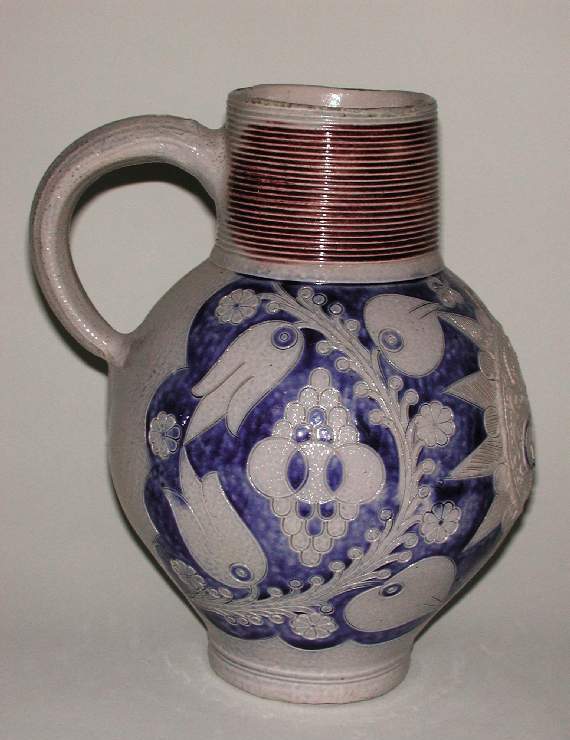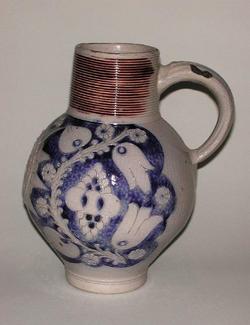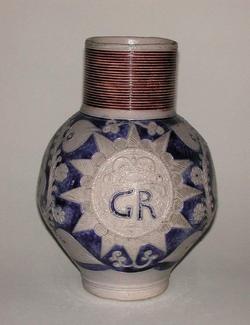Current Location: In storage
Maker(s)
Production:
Unidentified Westerwald pottery
Entities
Categories
Description
Grey salt-glazed stoneware with incised and applied decoration painted in bright blue and manganese-purple; on the front, is a medallion enclosing a crown over 'GR' and the date '1724', flanked by stylized floral decoration
Grey stoneware, thrown and turned, with an applied handle, incised and applied moulded decoration, painting in manganese-purple and blue, and salt-glaze. The jug has a bulbous body, a cylindrical neck with turned rilling, and a loop handle with two holes on the top to take a mount for the cover. On the front is a circular relief medallion enclosing a crown over the initials GR and the date 1724 with a winged cherub's head below. To the left of the crown are the joined initials HP and on the right a W. The medallion is surrounded by the incised rays of a star or sun. On either side, reserved in a bright blue ground, there is a boldly incised plant stem bearing tulips, leaves, daisy-like flowers, and circular buds, curving around a motif formed by three large circles with mounts of smaller semi-circles above and below.
Notes
History note: Sotheby's, 4 November 1904, lot 400; purchased for £1.12s.0d. by Dr J.W.L. Glaisher, FRS, Trinity College, Cambridge
Legal notes
Dr J. W. L. Glaisher Bequest
Measurements and weight
Height: 25 cm
Width: 21.8 cm
Acquisition and important dates
Method of acquisition: Bequeathed
(1928-12-07)
by
Glaisher, J. W. L., Dr
Dating
18th Century, Early
Production date:
dated
AD 1724
Note
The date indicates that the jug was made during the reign of George I (1714-27). A jug in the Victoria & Albert Museum has an almost similar medallion on the front with a crown, GR, and a winged cherub's head below, but no date (inv. no. 3735-1901).
School or Style
Baroque
People, subjects and objects depicted
Components of the work
Decoration
composed of
smalt
( produced by fusing cobalt with an alkali, usually potash, and sand, grinding to a powder, and mixing with water)
manganese-oxide
Surface
composed of
salt-glaze
Base
Diameter 8.5 cm
Body
Neck
Materials used in production
grey
Stoneware
Inscription or legends present
Inscription present: large initials with much smaller date below; the 1 is crossed by a paraph and the 2 is like a Z
- Text: GR/1724
- Method of creation: Moulded in relief
- Type: Inscription
- Text: HP joined and W
- Location: On medallion
- Type: Maker's mark?
References and bibliographic entries
Identification numbers
Accession number: C.2051-1928
Primary reference Number: 73051
Old object number: 2163
Stable URI
Audit data
Created: Saturday 6 August 2011
Updated: Tuesday 30 April 2024
Last processed: Tuesday 15 July 2025
Associated departments & institutions
Owner or interested party:
The Fitzwilliam Museum
Associated department:
Applied Arts






